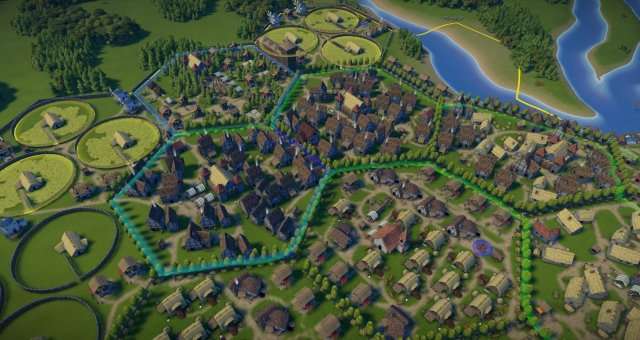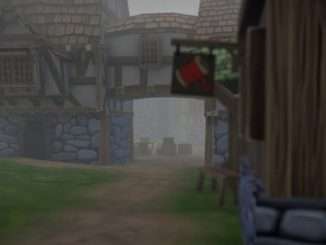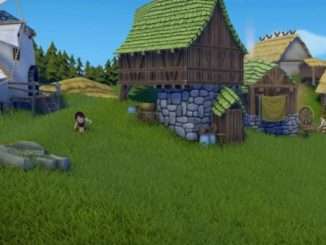
Just the Basics. How to get started, the things you might not know or realise.
Guide to Basics
Getting Started
- Build your Manor with the doorway facing you, so you’ll see the envoy.
- Trade panel. Set everything except food to sell over 80 units from the start. Will keep you afloat early on.
- Two or more stone cutters or gatherers can use the same resource.
- Houses are built on zoned land only. Zone around churches, placing wells and decorative trees to improve the ground for better buildings.
- Try to build a residential core with businesses on the outer edges.
- Villagers love water.
- Click a villager and see their wants. Follow one who has a red stat and see how far they need to go to fix it.
- Build Granaries and Warehouses near the locations of resources and then buildings that process them nearby (woodcutters > warehouse > carpenter).
Faith
- Size of Church equals how many people can enter.
- Settlers will travel to church, the radius lines when you build aren’t hard and fast areas of capture.
- Start with rustic churches but once you get Churches build them so they cover the same area and then demolish the rustic one.
- Extensions are expensive, simply building multiple new churches.
Desirability
- Churches and wells add quality to the land and fulfil desires.
- Use decorative trees to improve land desirability for housing.
- Later fountains and statues do a better job than trees.
Trade
- Have a warehouse or granary stock an item (e.g. wood) and make sure it it set to the green tick for that item.
- Open the Trade panel.
- Unlock at least one trade route.
- Open the Trading Resources tab.
- Put a number against a product (e.g. 80 Wood).
- Click the green up arrow to buy from traders (when they pass) wood until you have 80 wood in a storehouse either from them or your own gathering.
- Click the red down arrow to sell anything above 80 wood to traders.
Splendour
- Add decorations (esp things like barrels that have no monthly cost) to add Labour Splendour.
- Add Manor banners and toparary for Labour Splendour.
- Build churches for Clergy Splendour.
- Build a fort and add banners to it and the area around for Kingdom Splendour.
Food
- Start by concentrating on berries, then fish (if you are coastal), then bread, then cheese.
- Fishermen will fish stocks that are in uncontrolled territories if they are near by.
- Don’t forget to add markets and new stalls for new foods.
- If you dont promote settlers they will only desire berries and fish.
- Use trade to sell excess high level food (cheese+).
- Wheat never gets to Granaries, they go direct to the Mill.
- Monasteries are modular so you have to build the core and an extension.
- Make the extension a dormitory.
- Edit parts to add the food buildings.
- Vineyards need grow areas painted.
- Only male settlers can be converted to monks.
Combat
- Build a fort.
- Add decorations and (10) training dummies.
- Add settlers and import swords if you arent already making them.
- Give each a sword in the army panel.
- Let them all train until they are maxed out.
- Click on an easy mission.
- Add all settlers to the expedition.
- Send them off.
- There will be 2 popups later asking if you want to let them carry on fighting.
- As long as the odds are average or above say yes.
- They will bring back goods and be wounded.
- Let them return to full strength and backfill casualties.
- Attempt higher difficulties.
- Look for improved weapons and swap out your swords for them.
- Take on an extreme mission for a blueprint to study in your manor with a study extension.
On-Going Play
- Always have the resource panel open so you can stockpile (and turn it off once done) and to spot food shortages happening.
- In most games I find the tipping point is 100 settlers. At this point things get twitchy and recessions and cockups hit hard and fast.
- Open the villager and workplace list’s often to look for over immigration and use to ensure critical jobs are assigned first.
- Turn off immigration in the village information window to avoid recession.
- Watch the estate manager panel to see what you need to level up and get bonuses for.
- Settlers need markets to get fed, as you add food types (and luxuries) you’ll need to add a stall to sell it.
- Place a forester in one area off to the side of your village and have 2 woodcutters, 2 charcoal, Warehouse makers for a good supply.
- You can forest over any resource and not interfere with gathering of berries or stones.
- Don’t over promote settlers. They dont really care if they are higher status but will demand more if they are. Only promote people in batches of 4, to get to the bonus levels in the Estate Manager.
Money and Recessions
Keep track of how much gold you need to pay for maintaining your buildings and land. These costs can become a big problem if you’re not careful.
When you have three wheat farms, they might not work properly and won’t plant in all available spaces. This is a known issue. Just wait and they’ll start working again on their own.
If your people start leaving because they’re unhappy, check the Global Happiness icon to see what’s wrong. Fix each problem one at a time – build churches, make more food, or plant trees near houses to fit more people.
When someone quits an important job like food production or market sales, replace them with workers from less critical jobs like luxury goods or resources you have plenty of.
If you want to play it safe, add one new type of production every game month. This prevents big drops in happiness and makes it easier to fix problems.
Remember that you can recover from most mistakes. The high-class citizens might leave, but that’s okay. Just focus on getting your basic production working again – especially food, wood, and stone.
Experienced Tips
- Place a bunch of markets with variety of goods and food together.
- A well and a worship place nearby.
- After 800 population do not use the x3 speed, reduce it to x2.
- After 1500 population use x1 speed.

Always plan out the new expansion with respect to available land, number of production units, housing and then the church capacity (keep the church capacity to always on a higher side and don’t exhaust the population on the exact capacity).
The market slots are being used in sequential order of build, so for example if there are three food stalls built together, villagers would buy first from the first stall and if not available then they’ll switch to the next one. (could be really helpful if you can shuffle the food slots in different zones – like berries in slot 1 for one zone and in slot 3 for another zone).
I would suggest that build the Keep to unlock the hunter hut and weapons smith (you would need 3 cores and supplements), then delete it to avoid spending for its maintenance in early game. Later, when the economy is in surplus, rebuild it.
The most complex production is that of wheat in late stages. No matter how many wheat farms you build production is really difficult to understand. Sometimes it is in 1000+ surplus and sometimes it comes down to 0. But I feel the trick is to build quite a few of them with a small area of cultivation for each as I noticed for bigger painted fields most space gets wasted for nothing. (another thing, don’t distribute bread too much in the markets, you will also need eggs to sell in the market and also for pastry).

- Always remember to reduce the game speed to max x2 during bad weather!
- The covered bridge set by vjraymon is an excellent addition as the in-game bridges are mostly glitchy and takes a lot of resources and time to build.
- The cattle farm and butchery can be a life saver for food supply during bad weather.
- The knife grinder can be supportive to tailors’ workshop as it exhausts tools quite fast but don’t use it for sole supply of goods.
- In mid game and late game stop selling all food resources as you will need them all.
- The trading mod where you can sell iron ore to buy iron is quite useful.
Planning Strategy
- It’s better to plan out before expanding as it really messes up the synchronicity if you keep on deleting buildings to avail more space for your desired building type.
- For this I would suggest that initially begin by planning in the following order
- One church/rustic church with 50 capacity, one or two wells, one set of markets, one granary, one warehouse and production units within 2 or three hexes.
- Then when you expand, keep a gap of one hex from the previous settlement which can be later on filled up
- This will help you to make space for any contingencies that arise in the production chain when you expand.

Do not assign more than five soldiers to your manor or Keep just yet.
- You will need only five to send them to mission (though you can do it with less)
- Soldiers do not produce anything – they only consume – so they are the type of villagers for whom you can afford to keep them far from their houses if such a situation arise.
Keep your builders rotating – but while doing so always keep builders spread out amongst most of the zones as you never know where you will need them.
- I used 6 builders initially – 9 during mid game and 12 during late game.
Always remember to check/uncheck the accept new villagers’ box as per your need.
- Do not keep on accepting villagers without knowing where to employ them as they will eat out resources freely and your production chain will begin to crumble.
For the hunter’s hut to work efficiently consider the following points.
- Leather production stops if deer meat is not being sold consistently.
- Leather production becomes deficit if deer meat is sold too fast.
- Hunter needs a forest and not any open land.
- Its not viable sometimes to build hunters hut within existing forests, rather plan out the zone then assign some foresters to densify the forest, delete them and then build hunters hut – a lot of them.

While deleting a production building do not forget to first unassign the worker there – as they will remain to be that specific worker even if you delete the building and then it would be practically impossible to locate that villager who is a worker of some sort but not producing anything and neither being shown as unemployed.




Be the first to comment